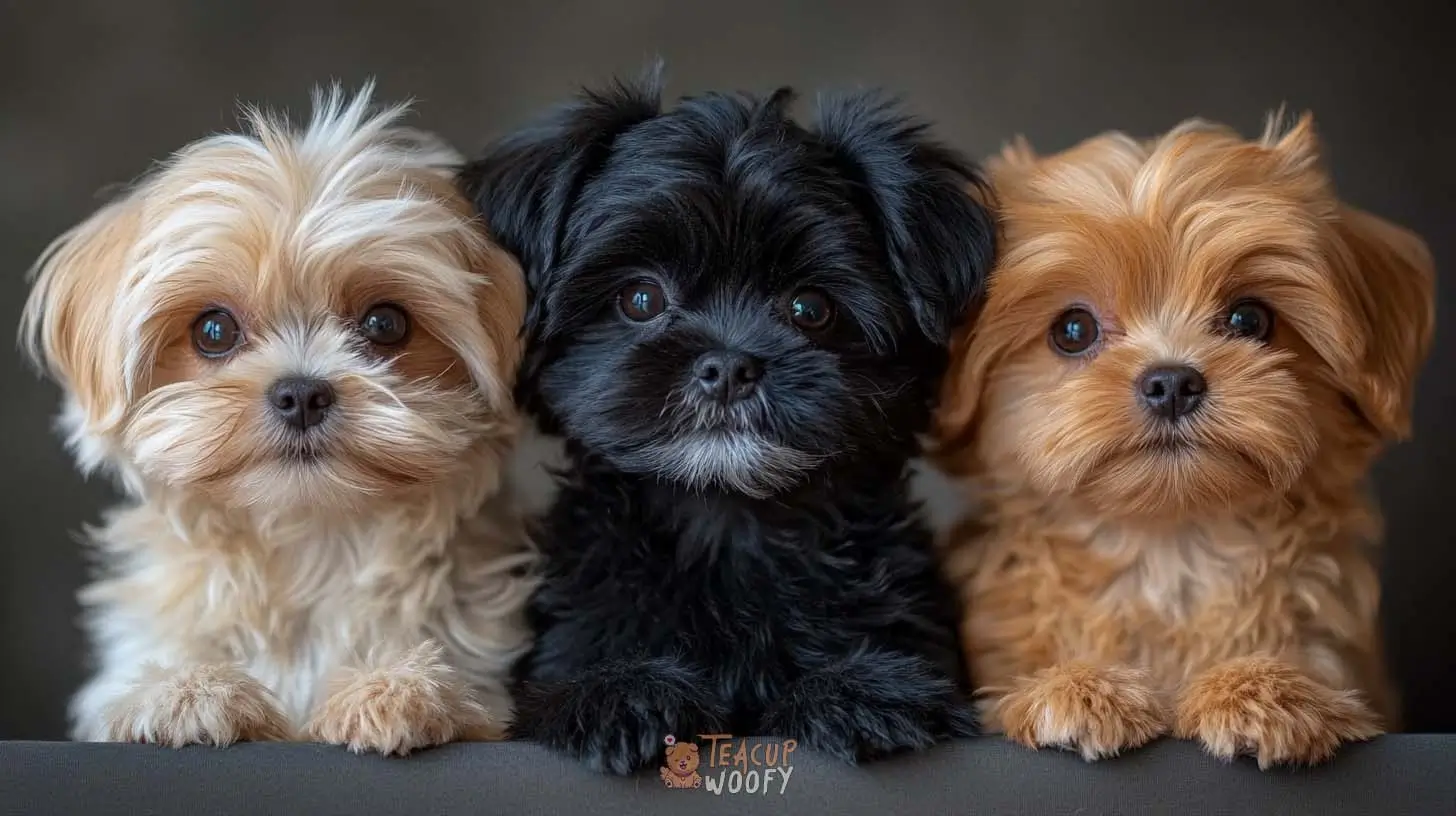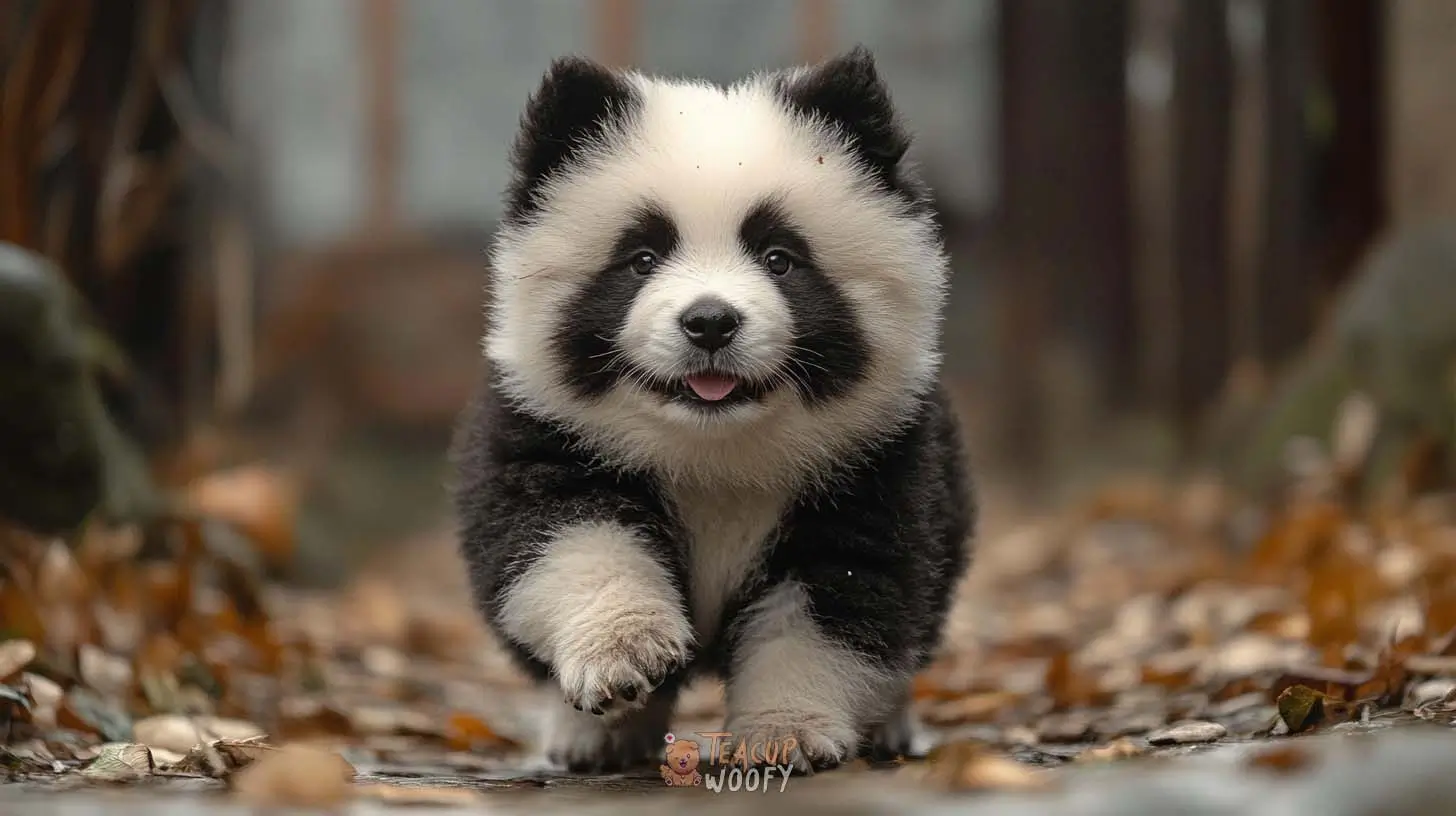Hey there, if you’ve ever googled Teacup Shih Tzu for sale, I totally get you. I’ve been in that spot, torn between “this little fluff is so cute” and “what do I even need to know before bringing one home?” As a mom who’s done her homework (and oh yes, Googled way too many puppy pics), I want to share what I found out, so you can make a smart choice, one that’s not just heart-pulling but healthy, safe, and long-lasting.
The teacup Shih Tzu is basically a miniature version of the regular Shih Tzu breed. We’re talking about pups that tend to weigh 5-7 inches tall, around 6-8 pounds, with a lifespan of about 10-15 years if everything’s done right.
But, and this is a big but, there are serious things to consider when shopping for a teacup Shih Tzu for sale. Health risks, breeder ethics, cost, how fragile these tiny pups are, daily care (like grooming, feeding, exercise), all that matters. I want you to walk into this decision informed, and excited in the right way.
Origin & History of the Teacup Shih Tzu
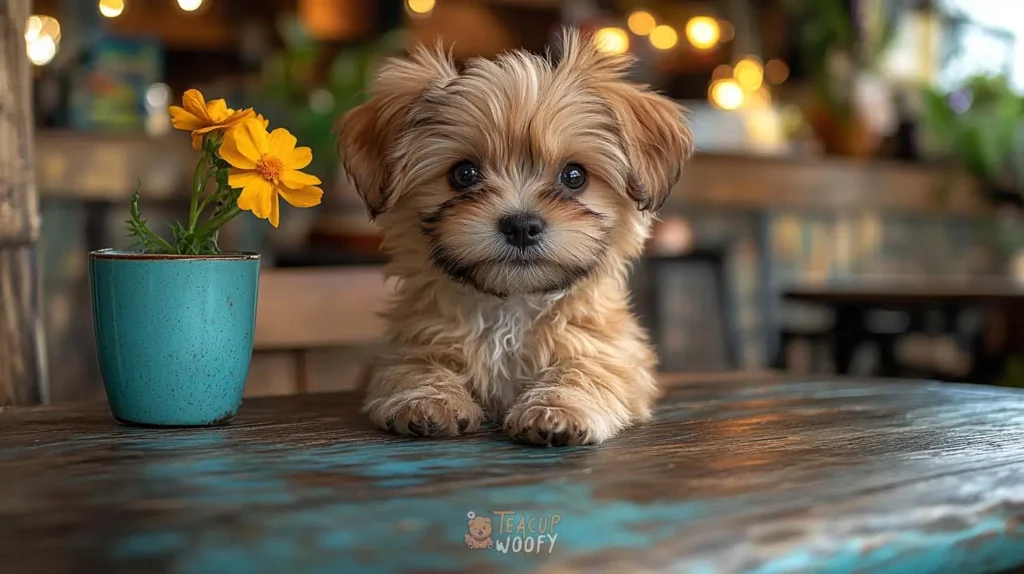
The Shih Tzu has deep roots going back over 1,000 years, believed to have originated in Tibet before becoming a favorite lap dog in the Chinese Imperial Court during the Ming Dynasty (1368–1644) (AKC). The breed’s name means “little lion” in Mandarin, symbolizing its sacred status in Buddhism.
By 1928, the first Shih Tzus were brought to England, and the breed quickly gained popularity in Europe. It was officially recognized by the UK Kennel Club in 1940 and by the American Kennel Club (AKC) in 1969.
The teacup Shih Tzu isn’t a separate AKC-recognized breed but rather a selectively bred, much smaller version of the traditional Shih Tzu. These tiny pups usually weigh 6–7 pounds and stand about 5–7 inches tall (Hepper).
Size & Appearance of the Teacup Shih Tzu

Coat Variants
- The teacup Shih Tzu has a long, silky double coat that is usually straight or gently wavy. DogAcademy.org
- Color variants include:
• Solid (single color)
• Bi-color (two colors)
• Multi-colored (more than two)
• Occasionally brindle pattern shows up. - Because the coat is dense and soft, grooming is a must (brushing often, trimming if desired).
Growth & Weight Chart (Standard vs. Teacup)
Here’s what I found for typical Shih Tzu growth plus notes on smaller (teacup) size:
| Age | Standard Shih Tzu (Weight / Height) | Teacup Shih Tzu Estimate* |
| Birth | < 1 lb; 1–2 in height | same birth size generally |
| 4 weeks | ~1.5 lbs; 2-4 in tall | may be slightly lighter (< 1.5 lb) depending on breeders |
| 8 weeks (2 months) | ~1.5-2 lbs; 3-4 in | similar, sometimes at lower end if teacup |
| 3 months | ~3-7 lbs; 5-6 in | often in lower half of that (3-5 lbs) |
| 6 months | ~6-12 lbs; 7-8 in | teacup may be ~5-8 lbs, height ~6-7 in if very small type |
| 9 months | ~7-14 lbs; 8-9 in | likely ~6-10 lbs; height slightly under standard |
| 12 months / Adult | Standard = approx 9-16 lbs (4-7.5 kg); height 8-11 in (≈ 20-28 cm) at shoulder. | Teacup = often 6-9 lbs, 5-7 in height. |
*Estimate = teacup or “mini” versions that are purpose-bred to be smaller. These often fall below standard breed sizes, which sometimes raises health concerns.
Male vs Female by Age
From sources I found, there isn’t a HUGE difference in height and weight between male and female standard Shih Tzus, but males tend to be slightly heavier/larger. Here’s a simplified comparison:
| Age | Male Standard Shih Tzu | Female Standard Shih Tzu |
| 6 months | ~8-12 lbs; 7-8 in | ~7-11 lbs; maybe 6-8 in |
| 12 months / Adult | ~10-16 lbs; 8-11 in | ~9-15 lbs; height slightly less (8-10 in) |
*Note: The “teacup” size isn’t officially recognized in many kennel clubs, so “teacup Shih Tzu” estimates vary a lot depending on breeder and genetics. These smaller sizes often come with increased health care needs.
Growth & Adult Size of the Teacup Shih Tzu
When Will a Teacup Shih Tzu Stop Growing?
Most Shih Tzus, including the teacup variety, reach their full height and nearly full weight by around 9–10 months. After that, growth slows and they usually finish filling out by 12 months.
What Is the Size of a Full-Grown Teacup Shih Tzu?
- Height: about 5–7 inches at the shoulder.
- Weight: typically 6–9 pounds, compared to the standard Shih Tzu’s 9–16 pounds (akc.org)
- Body type: sturdy yet compact with a round face, short muzzle, and long flowing coat
Breed Overview: Teacup Shih Tzu
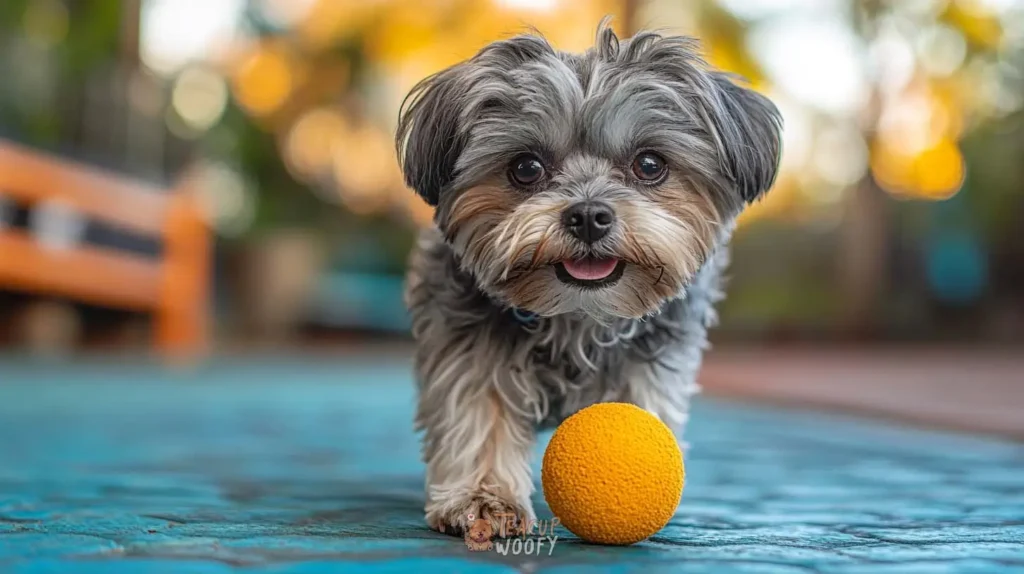
- Group: Toy dog, mini version of the Shih Tzu
- Size: Extra small companion breed
- Height: 5–7 inches full grown
- Weight: 6–8 pounds adult weight
- Coat: Long, silky, double coat, requires daily grooming
- Coat Colors: Black, red, gold, liver, brindle, gray, bi-color, tri-color, multi-color
- Lifespan: About 12–15 years, slightly shorter than standard Shih Tzu
- Temperament: Affectionate, playful, sociable, loyal, sometimes stubborn
- Hypoallergenic: Low-shedding, often marketed as hypoallergenic, but not fully allergy-free
- Origin: Shih Tzu originated in Tibet and Imperial China; teacup variation is a modern selective breeding
- Price: Typically $1,000–$2,000, some up to $5,000 depending on rarity and breeder
- Average Monthly Expenses: Around $150–$400, covering food, grooming, vet visits, and supplies
Breed Characteristics: Shih Tzu & Teacup Shih Tzu

- Affection Level: Very high. Shih Tzus are known to be loving, cuddle-bugs. They thrive on human attention.
- Friendliness: Very friendly with family, strangers, and usually with other pets too if socialized early.
- Kid-Friendly: Yes, generally good with children because of their gentle temperament. However, because they’re small, supervision is needed so kids don’t accidentally hurt them.
- Pet-Friendly: Good. Many Shih Tzus get along well with other dogs and pets when introduced properly.
- Exercise Needs: Moderate to low. Daily short walks (20-30 minutes) plus indoor play is usually sufficient. They don’t need huge amounts of strenuous exercise.
- Playfulness: Fairly playful. They enjoy toys, interactive games, lap time, being involved with the family.
- Energy Level: Moderate. Not “zoomies all day” high-energy but enough bounce to keep you smiling. Enough energy for play, but they also enjoy lounging.
- Health: Generally healthy if well bred and well cared for. But prone to certain breed-specific issues: brachycephalic (flat face) problems (breathing, heat sensitivity), patellar luxation, dental crowding, eye problems, etc. PetMD+1
- Sociability: High. They tend to want to be around people, don’t like long periods alone, can develop separation anxiety if isolated too much.
- Trainability: Good, though slightly stubborn. They respond well to positive reinforcement, treats, praise. House-training may take time. Consistency is key.
- Intelligence: Above average for a toy breed. They’re smart about learning what pleases humans; can learn tricks and commands, but may test boundaries occasionally.
- Tendency to Bark: Moderate. They may bark when alerting (doorbell, strangers), or out of boredom. They’re not silent dogs, but with training their barking can be managed.
- Amount of Shedding: Low to moderate. They shed less than many breeds; much of the shed hair is caught in the coat rather than blown everywhere. But because of the long double coat, grooming is intensive to prevent mats and to remove loose hair.
Adopt or Shop
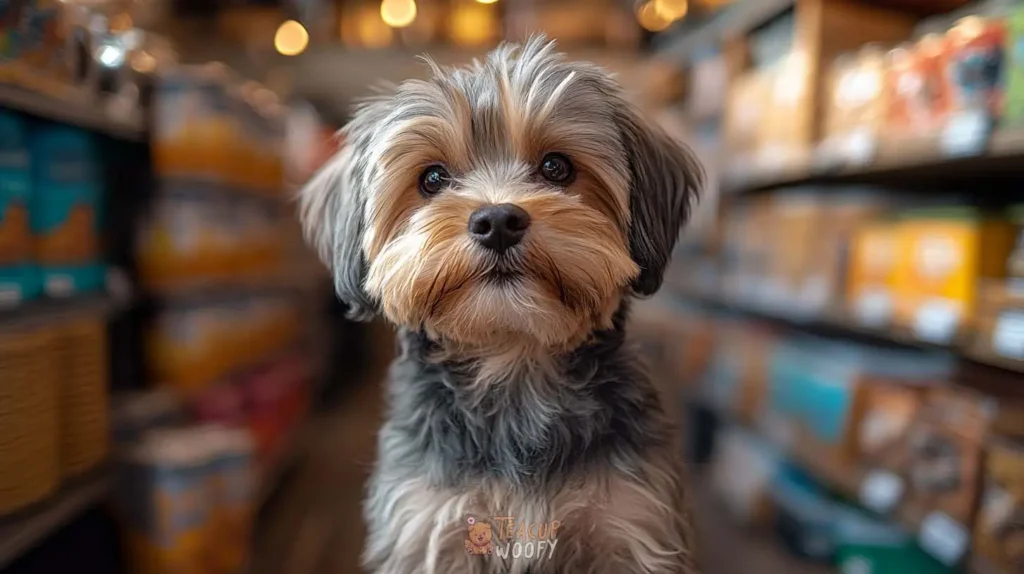
Cost of Buying / Adoption
- Buying a teacup Shih Tzu from a reputable breeder usually runs US$1,500-US$2,000 (sometimes more for rare colors, small size, or show lines).
- For “micro tiny teacups” or “specialty colored” pups, some breeders charge $8,975 and up.
- Adopting (rescue / shelter) a Shih Tzu (not always teacup size, but sometimes) can cost US$100-US$300, and often includes basic vet work (shots, spay/neuter).
What to Consider While Buying One
When I looked into this, I made a list of what I’d check if I were you:
- Reputable breeder vs backyard breeder
- Ask to see health clearances for parents (eyes, spine, heart etc.).
- See puppies in person, visit the breeding environment.
- Make sure breeder doesn’t breed dogs underweight or under size for the sake of “cute” because that often causes health issues.
- Health guarantees
- Ask about common teacup Shih Tzu risks: breathing problems (flat muzzle), dental issues, hypoglycemia, fragile bones.
- Make sure vaccinations, deworming are up to date.
- Written guarantee if possible.
- Size legitimacy
- “Teacup” is not an official breed standard. It can mean different things to different people. Some breeders wrongly use it for size-over health.
- Be cautious of extreme smallness (pups under ~5 pounds) because that increases risk.
- Cost beyond buying
- Grooming: long coats need brushing, trimming.
- Vet costs: more often checkups, possible surgeries.
- Diet: high quality food for small toy breeds can cost more per pound.
- Supplies, training, etc.
- Temperament, socialization
- Puppies should be socialized early.
- Make sure you get a pup that has been around humans, sounds, other pets.
- Ask if parents are healthy temperamentally (friendly, not overly timid or aggressive).
- Legal / Ethical issues
- Make sure the breeder follows local laws.
- Avoid puppy mills.
- If adopting, ensure the shelter/rescue is ethical.
Most Expensive Teacup Shih Tzu for sale

Okay, so let me be real here. When I first started looking into teacup Shih-Tzu puppies for sale, I nearly fell off my chair at the prices. As a mom who’s juggling grocery budgets, school runs, and, yes, a family pet fund, the sticker shock was real.
From what I’ve seen, the average teacup Shih-Tzu runs between $1,500 and $2,000, which already feels like splurging compared to rescue adoption fees of $100–$300. But the “fancy” ones? That’s where it gets wild.
Breeders like Texas Teacups list “specialty colored” or “micro tiny” teacup Shih-Tzus starting at $8,975 and up. And yes, I said starting. These are usually the super small pups with rare coat colors or “imperial” bloodlines, and honestly, they cost more than the used minivan I drive my kids to soccer practice in.
Here’s the breakdown I found:
- Standard teacup Shih-Tzus: usually $1,875–$6,975 depending on size, health guarantees, and coat colors.
- Micro or imperial teacups: often $8,975+ if they’re extra tiny or have unusual markings.
- Show-quality bloodlines: can push the price past $5,000, especially if the breeder is well-known.
Now, as a mom, my instinct is to ask: is that worth it? I mean, for that price, I expect the dog to vacuum my living room and make the kids’ lunches. But here’s the truth, you’re paying for rarity, breeder reputation, and sometimes health guarantees. Still, I’d urge any parent to think carefully. Dogs this small often have more health issues, so beyond the initial price, you’re signing up for higher vet bills, special food, and regular grooming that can run $150–$400 a month.
Monthly Expenses for a Teacup Shih-Tzu

Here are typical cost ranges, pulled from reliable sources, adjusted for a toy/teacup size dog. These are estimates; your real costs might be lower or higher depending on where you live, how fancy your vet is, etc.
| Category | What it includes | Estimated Monthly Cost* |
| Food | High-quality kibble / wet food; small portion sizes; occasional treats. | US$20-$40 / month for good quality food. Sometimes cheaper if you buy in bulk or use less premium brands. |
| Veterinary (routine / preventative) | Vaccinations, annual check-ups, flea/tick + heartworm prevention, maybe minor issues. | US$30-$50 / month (routine). But putting aside extra in case of non-routine care is smart. |
| Grooming | Brushing, baths, trimming (ears, nails, coat), maybe professional groomer visits. | US$40-$60 / month if using a groomer regularly. If you DIY with supplies, could be somewhat less. |
*Estimated for a small/teacup Shih-Tzu living in a moderate-cost area. “Teacup” may add extra to vet/grooming due to fragility.
Teacup Shih Tzu for sale Summary
If you’re searching for a Teacup Shih Tzu for sale, you already know these tiny pups are more than just adorable, they’re a lifestyle commitment. With their long silky coats, playful personalities, and family-friendly nature, they’re irresistible companions.
But remember, the price can range from $1,000–$2,000 on average, with some “micro” or specialty colored puppies costing $8,000+ from top breeders. Monthly expenses for food, vet care, and grooming usually run $150–$250, depending on how pampered your pup is.
So whether you adopt, shop, or dream about it, a teacup Shih Tzu will fill your home with love, laughter, and a bit of extra budgeting.
Frequently Asked Questions:
How much does a teacup Shih Tzu cost?
Prices vary widely depending on breeder reputation, lineage, location, and health certifications. Some breeders list prices in the thousands for premium, well-bred puppies.
Are teacup Shih Tzus recognized by kennel clubs / purebred?
“Teacup” is not a recognized category in major kennel clubs. Many breeders treat it as an informal term for very small Shih Tzus. Some ethical breeders don’t use terms like “teacup” or “miniature” because of associated health risks.
What health issues are common in teacup Shih Tzus?
Because of their extremely small size, teacup Shih Tzus may be prone to issues like hypoglycemia (low blood sugar), respiratory problems, luxating patella (knee issues), dental problems, and fragile bones. Checking the puppy’s health screening records and breeder transparency is essential.

